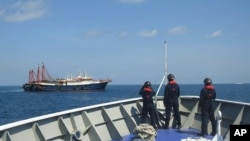China is showing new interest in working with Southeast Asian countries in the disputed resource-rich South China Sea as its superpower rival, the United States, gains diplomatic momentum under President Joe Biden, analysts in Asia say.
China, with Asia’s biggest military and economy, hosted a rare, in-person meeting June 7-8, bringing the foreign ministers of 10 Southeast Asian countries together with their Chinese counterpart, Wang Yi.
Wang and ministers from the 10-member Association of Southeast Asian Nations said in a June 9 statement from their meeting in the Chinese city Chongqing they had discussed the pursuit of “peaceful resolution of disputes” in the South China Sea and a resumption of talks toward “early conclusion of an effective and substantive code of conduct.”
Final signatures on the code of conduct — a document that would spell out ways of avoiding mishaps at sea without touching a sovereignty dispute involving six governments — will probably miss a 2021 goal because of its complexity and dearth of related discussions during the pandemic, observers say.
At this month’s meeting, China mainly wanted to get Southeast Asian governments on its side and pull them away from the United States, according to experts.
“This will be a way for China to try to shore up its defenses, shall we say, against a resurgence of pro-Western influence,” said Jay Batongbacal, international maritime affairs professor at the University of the Philippines in Quezon City.
China claims about 90% of the 3.5 million-square-kilometer sea that is prized for fisheries and fossil fuel reserves. ASEAN members Brunei, Malaysia, the Philippines and Vietnam call parts of the sea their own, overlapping the Chinese boundary line, and Taiwan claims most of the same waterway.
Southeast Asian countries have long recoiled over China’s landfilling of small islets in the sea for military use and passing vessels through waters they claim. ASEAN defense ministers Tuesday called for the early conclusion of a code of conduct as tensions rise in the region and — without naming any one country — for self-restraint.
China alarmed the Philippines in March by letting 220 vessels moor near a disputed islet in the Spratly archipelago and angered Malaysia last month by flying air force planes near Kuala Lumpur’s maritime claims. Maritime diplomacy has eluded the region since 2019 because of a lack of in-person meetings and the urgency of discussing COVID-19 instead of other topics.
Biden began his first foreign trip in office last week to strengthen ties with European allies. He told reporters the eight-day trip was to show China as well as Russia that the United States and Europe are still close.
Biden is trying to “consolidate” allies in Europe, so China must appear “conciliatory” in its own region, said Eduardo Araral, associate professor at the National University of Singapore’s public policy school.
Biden has upheld predecessor Donald Trump’s approach toward the South China Sea by bringing allies together to check Chinese military movements in the disputed sea. European allies have already backed Washington’s South China Sea agenda this year to date.
“I think China is trying to take advantage of this so-called transition from Trump to Biden,” said Alan Chong, associate professor at the Singapore-based S. Rajaratnam School of International Studies. “It’s a long transition, which I think hasn’t quite played out yet, and Beijing might well see this as an opportunity to pressure ASEAN to concede more points on the South China Sea.”
Southeast Asian states with maritime claims seldom side openly with China or the United States. Washington has no claim in the sea, but it periodically sends naval ships as gestures of support for the smaller disputants. China wants the United States out of the sea, but ASEAN countries privately hope the U.S. presence stops China from taking too much control there, Araral said.
China’s ability to call ministers together in person despite struggles with COVID-19 around Southeast Asia makes Beijing look good even without a code of conduct, experts say. The meeting was dubbed a “special” one to celebrate 30 years of China-ASEAN dialogue relations.
ASEAN members hope China can further help them normalize their economies in the aftermath of COVID-19 business closures, Chong said. Several ASEAN members, including the Philippines and Vietnam, have accepted Chinese COVID-19 vaccines despite the maritime friction.
Beijing “clearly wants to use this event to show it has ASEAN people on its side,” said Collin Koh, a maritime security research fellow at Nanyang Technological University in Singapore. China, as well as Southeast Asian countries, wants to be seen working on a “thorny” issue, he said.
“This is considered a diplomatic coup for China,” Koh said. “It manages to get all the 10 ASEAN member states to send their foreign ministers.”




